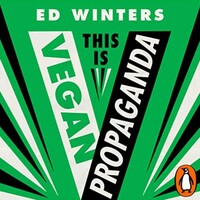Take a photo of a barcode or cover
informative
reflective
sad
medium-paced
Graphic: Animal cruelty, Animal death, Death
Absolutely loved it! So enlightening. I learned so much not just about the meat and dairy industry but how to talk about veganism. Really well written and explained. I still have some questions regarding the new ways that we are replacing meat but at least now I know how to go about it.
challenging
dark
emotional
informative
reflective
tense
slow-paced
dark
informative
reflective
slow-paced
challenging
dark
emotional
informative
reflective
sad
fast-paced
I think most people avoid having conversations about veganism because it makes them uncomfortable. It’s uncomfortable to think our choices may be causing unnecessary harm to animals, the environment, and us. My hope would be that we wouldn’t become defensive at the word “vegan” but simply curious. Why do you eat the things you do? What impact does this have on the environment? on your health? and is there a better alternative?
Live. Laugh. Eat More Plants.
Live. Laugh. Eat More Plants.
dark
emotional
hopeful
informative
inspiring
reflective
sad
medium-paced
dark
emotional
informative
reflective
medium-paced
I think I need to start with a lot of prefacing before I begin my review.
- Not a vegan, with no plans to ever be vegan.
- Understands that modern day farming practices are morally wrong and destructive: i.e. - it is morally wrong to be non-vegan
- Evaluating the book on the delivery of its message and other bookish merits, not on the ethics of its main point itself
The two defining characteristics of this book to me is that it is very methodical and very informative. This could be taken as both a good and bad thing, in that yes, it systematically debunks non-veganism with research and logic, but also happens to be a bit dull.
If we look at areas with more flair, the author dedicates a lot of this book in attempting what I'll call "shock conversion" - describing cruelty in graphic detail with the hopes that this will open the readers eyes. This is an effective method if you have never been "shocked" before, but as anyone who has encountered protesters on Pitt Street Mall before could tell you, if it hasn't worked the first time it's unlikely to work in the future.
Where the book does shine is when it spends time on points that I'm assuming most people do not intuitively know - not that meat can cause heart disease or that animals are gruesomely slaughtered in the industry - but in taking time to explore the cultural environment surrounding veganism. These ideas, like the industry's blatant propaganda and influence over both governments and "animal rights" organisations alike, the stigma/vilification of vegans in media, and even the entire section titled "Soy Boys and Fragile Masculinity" were what made me remember I was reading a book and not just a numbered dot point list of reasons to be vegan.
Quick fire list --
Something I liked: The pandemic chapter - a strong breakdown of how the meat-eating industry causes most of all disease which was a cool connection to current events
Something I disliked: A bit of a simplistic solution to all the problems brought up -- "Everyone on the planet should just be vegan!" is a nice thought. So is "Let's redirect all government funding!" and "Let's tax meat and build vertical farms with the tax money!" I was reminded a bit of high school debating here.
A bit more than 2.5, a bit less than 3.
- Not a vegan, with no plans to ever be vegan.
- Understands that modern day farming practices are morally wrong and destructive: i.e. - it is morally wrong to be non-vegan
- Evaluating the book on the delivery of its message and other bookish merits, not on the ethics of its main point itself
The two defining characteristics of this book to me is that it is very methodical and very informative. This could be taken as both a good and bad thing, in that yes, it systematically debunks non-veganism with research and logic, but also happens to be a bit dull.
If we look at areas with more flair, the author dedicates a lot of this book in attempting what I'll call "shock conversion" - describing cruelty in graphic detail with the hopes that this will open the readers eyes. This is an effective method if you have never been "shocked" before, but as anyone who has encountered protesters on Pitt Street Mall before could tell you, if it hasn't worked the first time it's unlikely to work in the future.
Where the book does shine is when it spends time on points that I'm assuming most people do not intuitively know - not that meat can cause heart disease or that animals are gruesomely slaughtered in the industry - but in taking time to explore the cultural environment surrounding veganism. These ideas, like the industry's blatant propaganda and influence over both governments and "animal rights" organisations alike, the stigma/vilification of vegans in media, and even the entire section titled "Soy Boys and Fragile Masculinity" were what made me remember I was reading a book and not just a numbered dot point list of reasons to be vegan.
Quick fire list --
Something I liked: The pandemic chapter - a strong breakdown of how the meat-eating industry causes most of all disease which was a cool connection to current events
Something I disliked: A bit of a simplistic solution to all the problems brought up -- "Everyone on the planet should just be vegan!" is a nice thought. So is "Let's redirect all government funding!" and "Let's tax meat and build vertical farms with the tax money!" I was reminded a bit of high school debating here.
A bit more than 2.5, a bit less than 3.
I have been vegan for over two years now and I have been following Ed since the beginning






